Judges: Chap 1, part 3: Compromising commands is the same as not fulfilling them.
Title: Judges: Chap 1, part 3: Compromising commands is the same as not fulfilling them.
Announcements opening prayer:
Benjamin is unable to drive the Jebusites out of Jerusalem.
Jdg 1:21 But the sons of Benjamin did not drive out the Jebusites who lived in Jerusalem; so the Jebusites have lived with the sons of Benjamin in Jerusalem to this day.
Since Jerusalem was in Benjamin it makes sense that Judah did not take it for themselves, however, Judah greatly helped their brother by sacking the city and burning it. It was up to Benjamin to permanently take it, but due to their weakness of faith they did not. The Jebusites possessed a formidable stronghold on Mt. Zion and when they retreated there the Benjamites couldn't find the strength to evict them. This would have wait until David, in which his general Joab likely headed an attack through the discovered secret underground spring that brought water to the fortress through which he stealthily found his way behind the thick walls and destroyed the inhabitants.
The attacks of the other tribes upon the Canaanites are briefly summed up in vv. 22-36.
The tribe of Joseph (Ephraim and western Manasseh) also conquered the city of Bethel.
Jdg 1:22 Likewise the house of Joseph went up against Bethel, and the Lord was with them.
Jdg 1:23 And the house of Joseph spied out Bethel (now the name of the city was formerly Luz).
Jdg 1:24 And the spies saw a man coming out of the city, and they said to him, "Please show us the entrance to the city and we will treat you kindly."
Jdg 1:25 So he showed them the entrance to the city, and they struck the city with the edge of the sword, but they let the man and all his family go free.
Jdg 1:26 And the man went into the land of the Hittites and built a city and named it Luz which is its name to this day [1000 BC].
Of their conquered territory, Bethel is mentioned because of its prominence in the history of Israel. It is quite possible that this was the only city taken by the sons of Joseph.
Bethel actually was allotted to Benjamin, but it was on the border of Benjamin and Ephraim. Ephraim could not stand to have such a prominent Canaanite city among them so they conquered it, however, they did not drive out all of the Canaanites from Ephraim as they were supposed to.
From the remaining towns of the land neither the Manassites, nor the Ephraimites, nor the tribes of Zebulun, Asher, and Naphtali expelled the Canaanites: all that they did was to make them tributary (vv. 27-33).
Remember that this is a part of the summary of the entire period that the historian begins the book with. Manasseh, Ephraim, Zebulun, Asher, and Naphtali are unable to drive out the Canaanites and take their cities and so they live around the Canaanites in the mountainous areas. After some undetermined amount of time, and likely after some of the judges have done their work in delivering Israel from oppression, these tribes become stronger, but with that strength they still don't drive out the Canaanites, but they settle for making them slaves, which is still a violation of God's command. Did they recognize that they could use the Canaanites to do the menial labor that they were too lazy to do themselves or to pay taxes so that they could acquire wealth they would not have had by following Jehovah's command?
1Sa 15:11
"I regret that I have made Saul king, for he has turned back from following Me, and has not carried out My commands."
1Sa 15:13
And Samuel came to Saul, and Saul said to him, "Blessed are you of the Lord! I have carried out the command of the Lord."
Can we compromise God's commands? Can we perform in a way that we feel is somewhat obedient to the Lord in our own eyes and find ourselves to be the recipients of His good pleasure?
There has been a lot of this going around in Christian America for the past several decades. As Christianity has gotten more and more liberal, the way of Christ has been altered by the church in order to accommodate the sinner's sinful way or selfish way. It is marketed as being compassionate, as not hurting the feelings of the one who desires his own way above God's. Watering down Christianity makes it palatable to some while taking all of the power out of it and so it is appealing to no one. Palatable and appealing are not the same thing. All sinners are invited into the church, no matter what the sin is, but we do not invite sin into the church, meaning that we don't condone sin, nor do we boast about sin, nor do we exalt in sin, but rather we hate sin as God hates it and we thank God that we are forgiven of it while we thirst and hunger to walk in righteousness by means of the grace of God.
2Ti 3:1 But realize this, that in the last days difficult times will come.
2Ti 3:2 For men will be lovers of self, lovers of money, boastful, arrogant, revilers, disobedient to parents, ungrateful, unholy,
2Ti 3:3 unloving, irreconcilable, malicious gossips, without self-control, brutal, haters of good,
2Ti 3:4 treacherous, reckless, conceited, lovers of pleasure rather than lovers of God;
2Ti 3:5 holding to a form of godliness, although they have denied its power; and avoid such men as these.
2Ti 3:6 For among them are those who enter into households and captivate weak women weighed down with sins, led on by various impulses,
2Ti 3:7 always learning and never able to come to the knowledge of the truth.
It would seem that at first the tribes could do nothing against the Canaanites in their respective territories, but then as the tribes got stronger they made the Canaanites vassals - still not fulfilling the command to drive them out.
Jdg 1:27 But Manasseh did not take possession of Beth-shean and its villages, or Taanach and its villages, or the inhabitants of Dor and its villages, or the inhabitants of Ibleam and its villages, or the inhabitants of Megiddo and its villages; so the Canaanites persisted in living in that land.
These towns are in the Jezreel Valley, which is the most fertile and most productive land in Israel. Since it is a plain it is also a trading route from the Mediterranean Sea to the inland and so the Canaanites put up as much resistance to secure these towns and the roads as they could. It worked but only due to the failure of Manasseh to faithfully carry out the command of the Lord by trusting in the Lord. We must remember that the historian is writing 350 years after the land allotment and not in real time. It may be that Manasseh failed completely at the start to enact any victory over these towns but then later after she had grown stronger, she was able to put them to forced labor, but the failure is still existent as they were to drive them out completely.
Beth-shean: door to Jezreel Valley, important trade route, subtropical paradise.
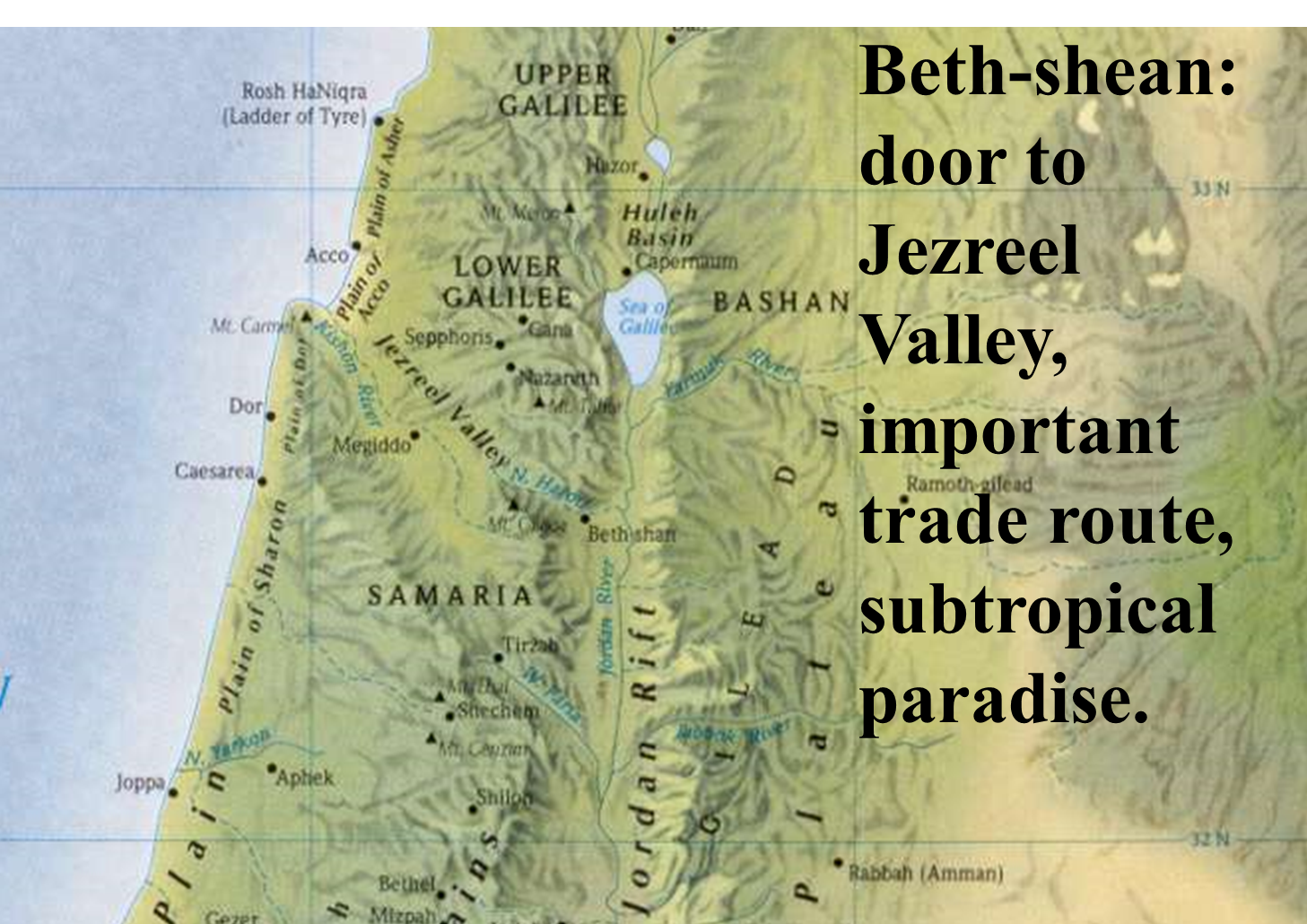
Beth-shean is located at the junction of the Jezreel and Jordan valleys. It is a most important place for the traffic of trade and a most productive place in its own right. It has numerous springs, wells, and tributaries, which have combined with the intense summer heat and rich soil to produce a subtropical paradise ideal for human habitation.
Tanaach and Dor and Ibleam were also important cities in the area of this coveted valley. Dor assisted Jabin in his battle against Joshua, only to be defeated. The king of Megiddo was defeated by Joshua, but Israel did not occupy the city and so it remained inhabited by Canaanites.
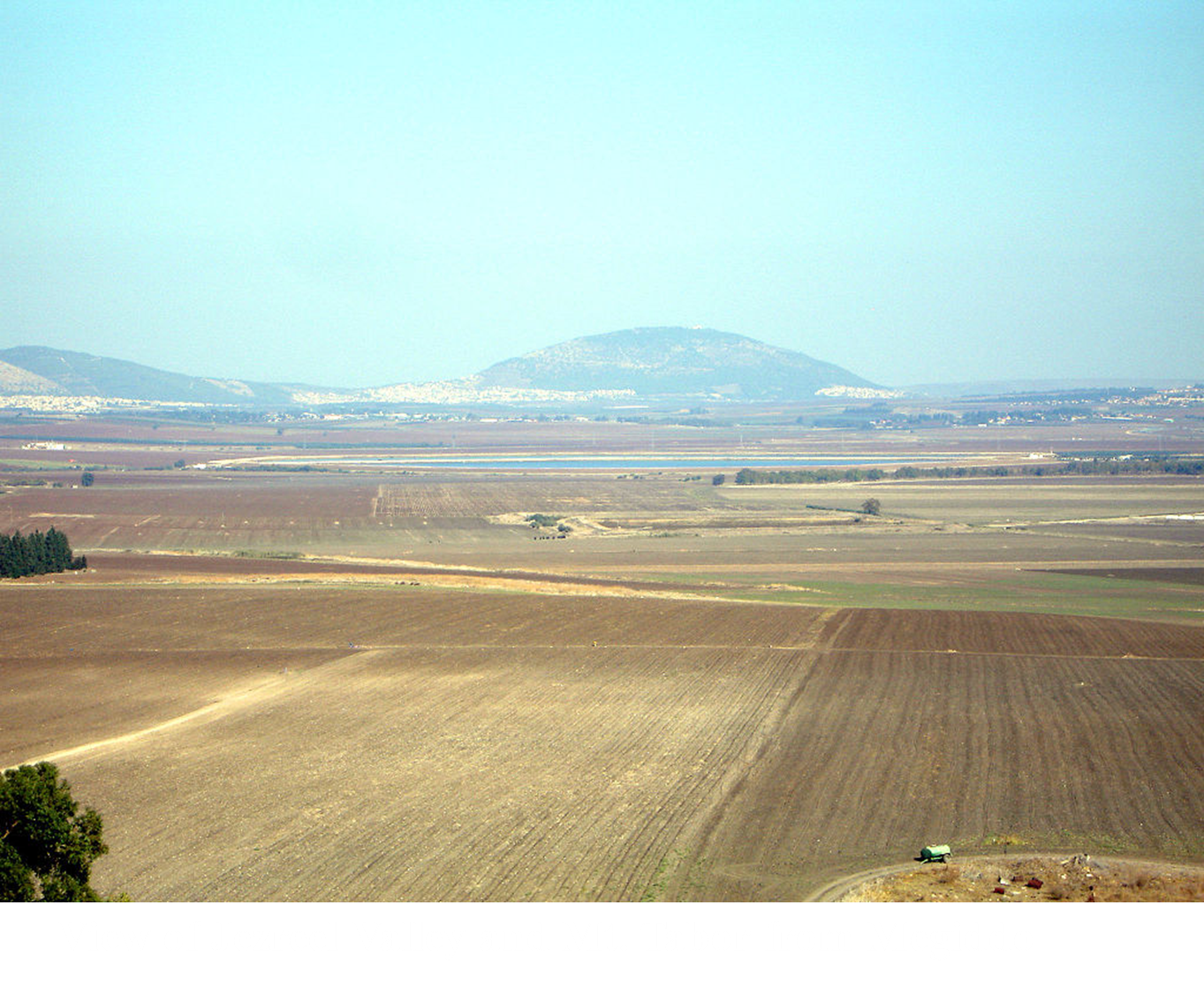
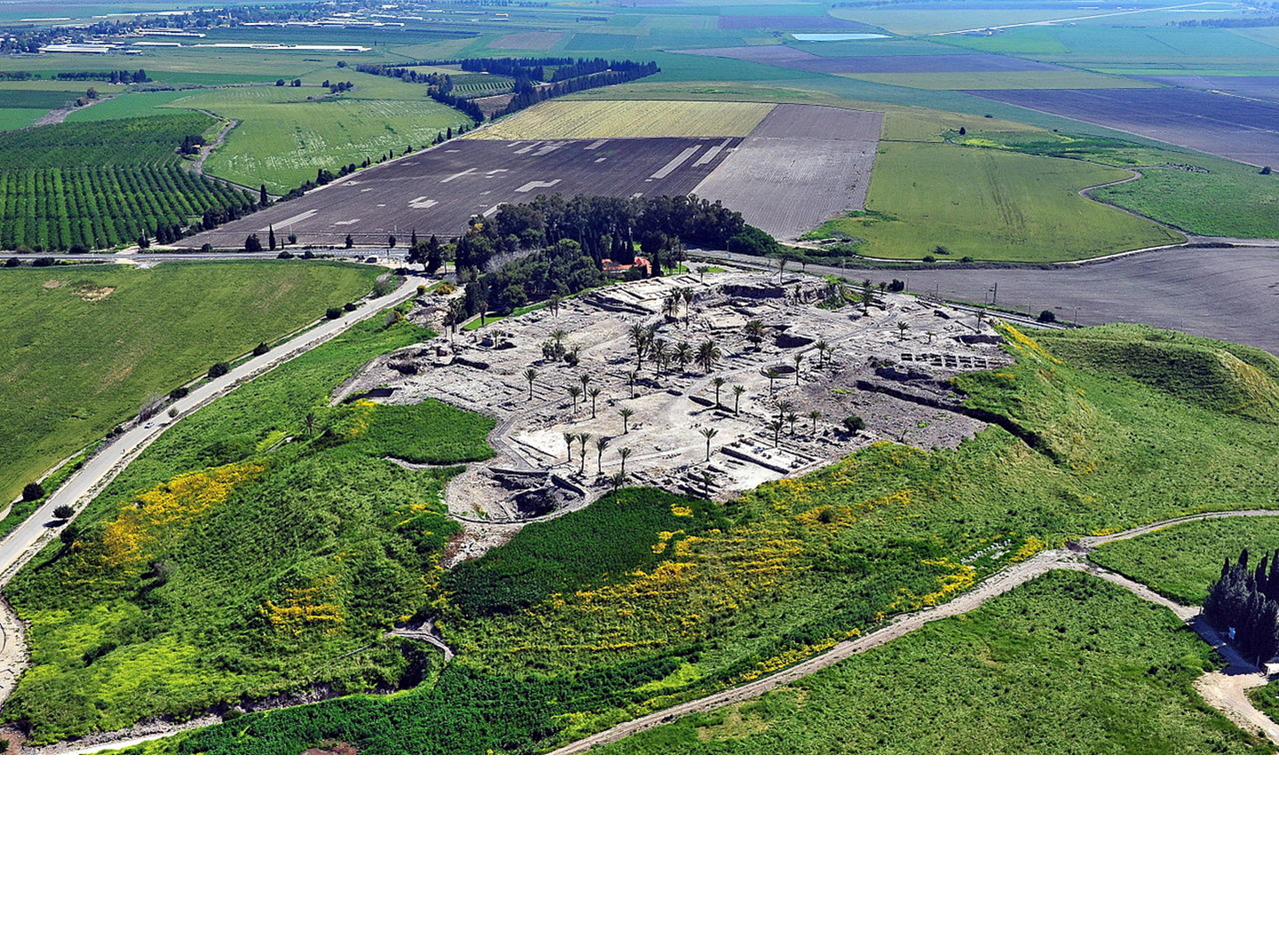
Megiddo is interesting since Armageddon means mountain of Megiddo which we find in:
Rev 16:16
And they [three spirits of the dragon, beast, and false prophet] gathered them [the kings of the earth] together to the place which in Hebrew is called Har-Magedon [mountain of Megiddo].
However, interpretations of this vary greatly and the problem with putting the armies of all the kings of the earth in this plain is that it's not big enough to hold that many men and their equipment, never mind having room to maneuver and fight. Zechariah has some of the armies of this final battle in Jerusalem itself, so it is difficult to determine if this is in fact the location of the war.
Aside from any of these details, the main impetus of the passage is that Israel did not do in faith what God had clearly and repeatedly commanded them to do and they clearly suffered the consequences of their sin.
Jdg 1:27 But Manasseh did not take possession of Beth-shean and its villages, or Taanach and its villages, or the inhabitants of Dor and its villages, or the inhabitants of Ibleam and its villages, or the inhabitants of Megiddo and its villages; so the Canaanites persisted in living in that land.
Jdg 1:28 And it came about when Israel became strong, that they put the Canaanites to forced labor, but they did not drive them out completely.
The inheritance of these towns and their failure to take possession of them were mentioned in Joshua, in the portions that we skipped over.
Jos 17:11 And in Issachar and in Asher, Manasseh had Beth-shean and its towns and Ibleam and its towns, and the inhabitants of Dor and its towns, and the inhabitants of En-dor and its towns, and the inhabitants of Taanach and its towns, and the inhabitants of Megiddo and its towns, the third is Napheth.
Jos 17:12 But the sons of Manasseh could not take possession of these cities, because the Canaanites persisted in living in that land.
Jos 17:13 And it came about when the sons of Israel became strong, they put the Canaanites to forced labor, but they did not drive them out completely.
And so, returning to Judges we find that the failure was the same throughout the other tribes.
Jdg 1:29 Neither did Ephraim drive out the Canaanites who were living in Gezer; so the Canaanites lived in Gezer among them.
Joshua had destroyed the army of Gezer [centralwest] several years before, but they rebuilt.
Jos 10:33
Then Horam king of Gezer came up to help Lachish, and Joshua defeated him and his people until he had left him no survivor.
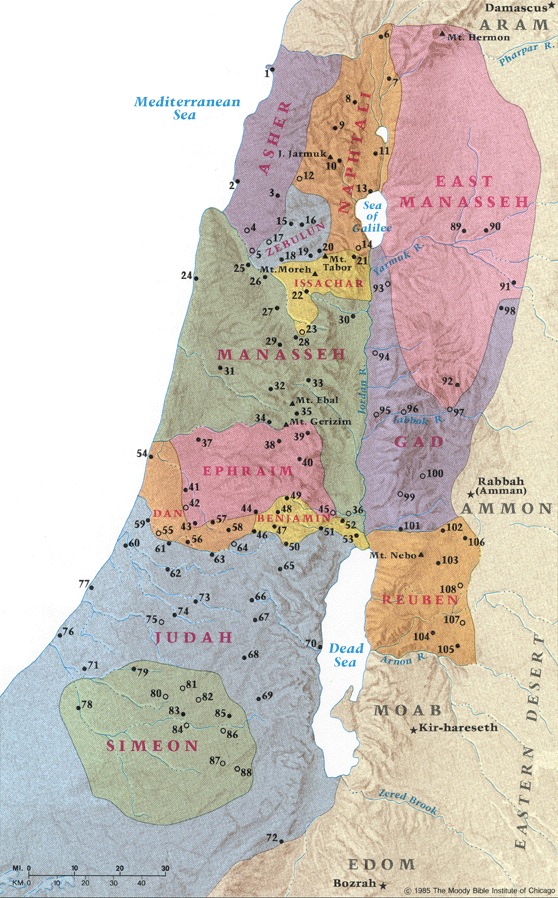
Jdg 1:30 Zebulun did not drive out the inhabitants of Kitron [only time mentioned], or the inhabitants of Nahalol [only time mentioned]; so the Canaanites lived among them and became subject to forced labor.
Jdg 1:31 Asher did not drive out the inhabitants of Acco [only time], or the inhabitants of Sidon, or of Ahlab, or of Achzib, or of Helbah, or of Aphik, or of Rehob.
Sidon was a prominent city on the Mediterranean coast less than twenty miles north of Tyre. It was well known for fishing, purple dye from mollusks, and luxurious gardens, orchards, and fruit trees. Along with Tyre, its sister city on the coast, it was never conquered. It's worship of Baal would infect Israel in the future with Jezebel.
Rehob marks the limit of the exploration of the 12 spies.
Num 13:21
So they went up and spied out the land from the wilderness of Zin as far as Rehob, at Lebo-hamath.
Moses sent twelve men to spy out the land, one man from each tribe, a leader of that tribe, and so Sethur the son of Michael from the tribe of Asher saw Rehob and since he was one of the ten that cried out that they couldn't take the land, his complaint is fulfilled by his children, as it was amongst the other tribes, but for Caleb and Joshua. And even the sons of Caleb and Joshua could not fully carry out the Lord's command.
Jdg 1:32 So the Asherites lived among the Canaanites, the inhabitants of the land; for they did not drive them out.
Jdg 1:33 Naphtali did not drive out the inhabitants of Beth-shemesh, or the inhabitants of Beth-anath, but lived among the Canaanites, the inhabitants of the land; and the inhabitants of Beth-shemesh and Beth-anath became forced labor for them.
The Amorites forced Dan into the mountains while they held the plains, but when Joseph got strong they pushed the Amorites into forced labor.
The Danites were actually forced back by the Amorites out of the plain into the mountains, because the latter maintained their hold of the towns of the plain, although the house of Joseph conquered them and made them tributary.
Jdg 1:34 Then the Amorites forced the sons of Dan into the hill country, for they did not allow them to come down to the valley;
Jdg 1:35 yet the Amorites persisted in living in Mount Heres, in Aijalon and in Shaalbim; but when the power of the house of Joseph grew strong, they became forced labor.
Jdg 1:36 And the border of the Amorites ran from the ascent of Akrabbim, from Sela and upward.
Dan continued to fight with the Amorites who were eventually conquered by the Philistines who drove Dan out of their land completely. They found refuge in the far north (Jdg 18).
The story of Dan is an interesting one. When looking at their territory we see that it is small even though they are many, but it is some of the most fertile land in Israel. It is also wedged between Ephraim and Judah, the two strongest tribes. It runs from the foothills of the mountains of Judah to the coast and therefore sits entirely in the plain, which as we have seen, is hotly contested by the Canaanites. The Amorites and their iron tipped chariots are too much for Dan and so they are forced into the hills. However, when Ephraim and Manasseh become strong they make the Amorites tributary and we can assume that Dan was able to take back much of their allotted land, but lived amongst the Amorites with whom they continued to fight all throughout the period of the judges.
However, another player has entered the situation; the Philistines. The Philistines have held the southern coast and they pushed the Amorites northward until they conquered them. They are not Canaanites but likely come from Crete or somewhere in the Aegean Sea.
The Philistines came from Caphtor (possibly Crete) and took the lands of the Avvim.
Deu 2:23
And the Avvim, who lived in villages as far as Gaza, the Caphtorim who came from Caphtor, destroyed them and lived in their place.
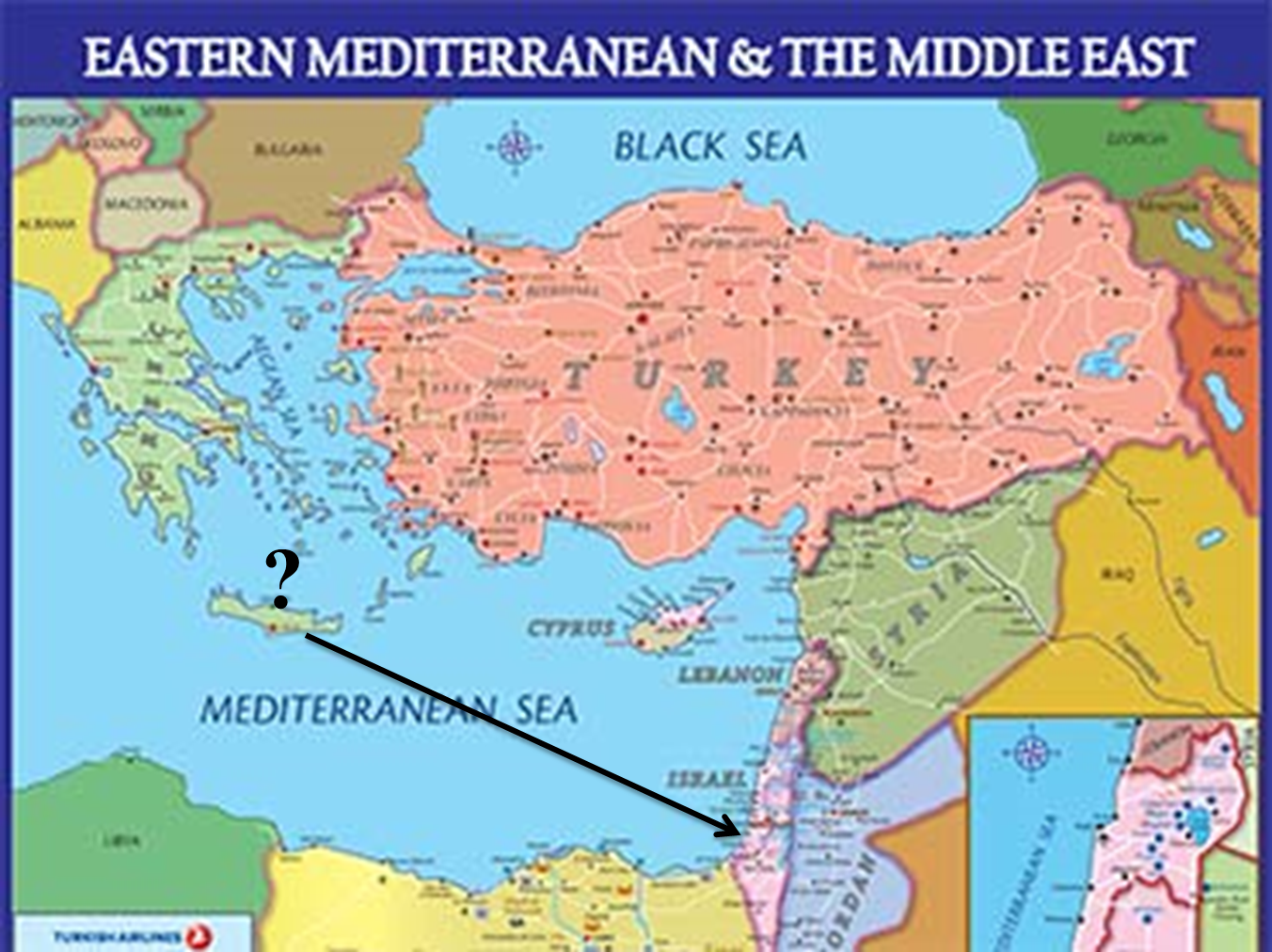
Though the Philistines are not Canaanites, God's mandate is to drive them out, Jos 13:1-7.
Jos 13:1 Now Joshua was old and advanced in years when the Lord said to him, "You are old and advanced in years, and very much of the land remains to be possessed.
Jos 13:2 This is the land that remains: all the regions of the Philistines and all those of the Geshurites;
Jos 13:3 from the Shihor which is east of Egypt, even as far as the border of Ekron to the north (it is counted as Canaanite); the five lords of the Philistines:
[these are listed and then skip down to vs. 6]
Jos 13:6 All the inhabitants of the hill country from Lebanon as far as Misrephoth-maim, all the Sidonians, I will drive them out from before the sons of Israel; only allot it to Israel for an inheritance as I have commanded you.
Jos 13:7 Now therefore, apportion this land for an inheritance to the nine tribes, and the half-tribe of Manasseh."
When the Philistines at last subdued the Amorites (1Sa 7:14), and approached the territory of Dan, the Danites tried to hold them back. But they were unable to resist them alone in the open field, and for this reason the book of Judges does not mention a judge who rescued the tribe of Dan from the Philistines but describes a desperate guerrilla war between the two. The hero of this fight was Samson (Jdg 13-16) of the tribe of Dan. At the end of the period of the judges, however, the remnant of the tribe of Dan had to leave their territory. They went northward to conquer a new territory (Jdg 18). Here they took the city of Laish, a Phoenician city at the north end of the Jordan Valley, and named it after their tribe.
Verse 36 explains the supremacy of the Amorites.
Jdg 1:36 And the border of the Amorites ran from the ascent of Akrabbim, from Sela [literally "the rock"] and upward.
Sela - the rock. Likely the rock in the desert of Zin where Moses drew water, hitting the rock twice.
In order to explain the supremacy of the Amorites in the territory of Dan, a short notice is added concerning their extension in the south of Palestine. This border runs all the way from the southern Negev desert to the hills of Judah. This is added by the historian to show us how strong the Amorites were without needing to tell us that they should be no match for the Danites or any other tribe.
At some point in the history of the initial failures by the tribes of Israel in chap 1, the Angel of the Lord appears to announce to them their punishment for not following the commands.